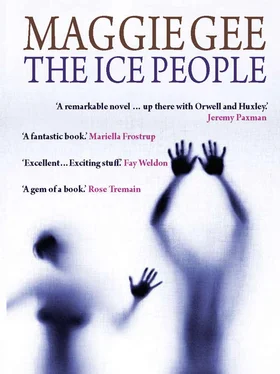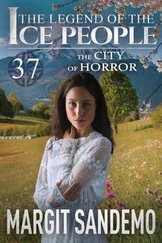Maggie Gee - The Ice People
Здесь есть возможность читать онлайн «Maggie Gee - The Ice People» весь текст электронной книги совершенно бесплатно (целиком полную версию без сокращений). В некоторых случаях можно слушать аудио, скачать через торрент в формате fb2 и присутствует краткое содержание. Год выпуска: 2008, Издательство: Telegram Books, Жанр: Фантастика и фэнтези, на английском языке. Описание произведения, (предисловие) а так же отзывы посетителей доступны на портале библиотеки ЛибКат.
- Название:The Ice People
- Автор:
- Издательство:Telegram Books
- Жанр:
- Год:2008
- ISBN:нет данных
- Рейтинг книги:4 / 5. Голосов: 1
-
Избранное:Добавить в избранное
- Отзывы:
-
Ваша оценка:
- 80
- 1
- 2
- 3
- 4
- 5
The Ice People: краткое содержание, описание и аннотация
Предлагаем к чтению аннотацию, описание, краткое содержание или предисловие (зависит от того, что написал сам автор книги «The Ice People»). Если вы не нашли необходимую информацию о книге — напишите в комментариях, мы постараемся отыскать её.
imagines an ice age enveloping the Northern Hemisphere. It is Africa’s relative warmth that offers a last hope to northerly survivors. As relationships between men and women break down, the novel charts one man’s struggle to save his alienated son and bring him to the south and to salvation.
Maggie Gee
The White Family
The Flood
The Ice People — читать онлайн бесплатно полную книгу (весь текст) целиком
Ниже представлен текст книги, разбитый по страницам. Система сохранения места последней прочитанной страницы, позволяет с удобством читать онлайн бесплатно книгу «The Ice People», без необходимости каждый раз заново искать на чём Вы остановились. Поставьте закладку, и сможете в любой момент перейти на страницу, на которой закончили чтение.
Интервал:
Закладка:
Soon we were winding up through the mountains, alone on the road, and the trees were thinning. The sun was brilliant, I closed my eyes … I think I slept for an hour or more, but then I was uncomfortably awake again, the pain in my shoulder like sharpened wire. We were inching up through fields of scree with just the occasional stunted conifer, grey scattered rocks and wizened bushes, going on for so long that I dozed again despite the perpetual switchback of the slopes. The next time I opened my eyes I was dazzled. There was snow everywhere; the world had turned white. Snowwhite banks on each side of the road sloped up and away to snowcovered mountains, and ahead of us, leading up to the pass, the sunlit snowfields went on forever. There was a little fresh snow here and there on the road, and our tyres crunched soothingly across it. I think that I began to feel lucky. Away to the left, through a lateral valley, we saw in the distance crumpled white peaks, the higher Pyrenees to the east, silvery, magical, minutely shaded, pink with the morning, blue with distance.
I wished we were on holiday, I wished we could cream through the dreamlike snowfields and then, when we were tired and peckish, circle back smoothly into the past, hotels and meals and money and safety …
But the winter world stretched on forever, and the car was so cold that our breath made plumes. We stopped for me to have a piss. I made steaming black holes in the perfect surface. The silence was unearthly, oppressive, as if all the human beings had died. We just heard a few unrecognisable calls of birds or beasts in the middle distance, cries of lust or hunger in a minor key, a lonely sound, not meant for our ears, part of a world that would outlive us.
Luke couldn’t stop exclaiming at the view. Of course, he had seen little for years but the inside of his horrible female nursery. Briony seemed to feel liberated too, smiling and chattering to Luke over her shoulder. Every few miles we passed a wrecked car, generally with everything pillaged, wheelless, windowless, its metal rusted, but that was normal on any road. On the horizon once or twice we saw matchstick figures with antsize animals, but we saw no other travellers, though weather conditions seemed so good. Probably it was simply too early.
My spirits were rising by the moment. We might get to the top in less than an hour; the road wasn’t bad, despite occasional rockfalls that made us drive too near the edge. The fresh snow seemed to have petered out. We had survived three tests already. The mountain pass might be our last, and travelling at this rate we’d be over by nightfall. Once we had crested the Roncesvalles Pass we would coast across Spain, southwards, sunwards. I imagined hot plains, true summer heat, white walls of houses in blazing sun, and soon their blankness grew confused with the snowfields …
I must have been asleep for over an hour when the car woke me with its new strange rhythm. It caught a little; it choked; stalled. Then the road dipped, and it went back to normal. When we climbed again, the stuttering returned. I was trying to concentrate on this when Briony’s unbelieving voice reached me.
‘Saul. The fuel tank can’t be empty? Have we got a can in the back?’
‘No. But you’re right, it can’t be empty. I filled up in the village yesterday.’ The fuel gauge said empty, but it wasn’t reliable.
‘I don’t suppose we’ve got a hole in the tank.’
I cut her off. ‘You’re being neurotic.’
She went on driving for four hundred metres before the road suddenly steepened sharply. The car coughed, strained, then ground to a halt.
I got out and looked. The tank seemed all right. I checked it over and saw nothing. Then Briony looked, and spotted a tiny crack right along the corner. That was the problem with hubron cars, which had been so popular when I was a boy. They were amazingly cheap, and extraordinarily light, onethird the weight of fibreglass, but they shattered unpredictably. You could mend them in minutes with a hubron melder, but the one that came with the car was a dud, as we had discovered back in Normandie. Ever since we’d been praying that nothing would go wrong.
‘What now?’ Briony asked, and just for a second she leaned her head against my shoulder, but I winced away involuntarily, in pain. I could think of nothing to say to her.
The snow stretched blankly away on all sides. It was still pretty early; nine AM, but soon other travellers would be on the road, other travellers, strangers, dangers. A dog, or some other creature, howled. I believe I kicked the car quite hard, waking up Luke, who asked what was the matter.
‘We’re fucked, that’s all,’ I may have said.
‘Tea,’ said Briony. I knew she was right. I got out the primus, and we used our bottled water, for with all this snow we should never want for water. I felt better with the tea, and we ate some tinned ham, and started to think what we could do. Should I hike back down the mountain and look for fuel? Should we flag down the next car and beg or buy just enough fuel to get us over the mountain?
‘They’ll never stop,’ Briony said. ‘I mean, we might be murderers.’
‘He is a murderer,’ Luke quipped.
It made me think. How far would I go? I had a gun. If we stopped a car I could siphon off all their fuel at gunpoint, I didn’t have to play Mr Nice Guy. But I was Samuel’s son, a policeman’s son. Yes, but he’s dead, another voice said. And it will get very cold, on this mountain. Do something, or you’ll die too .
‘We could try on foot,’ said Luke. ‘There must be footpaths across these mountains —’
‘— But we don’t have maps. And how about Dora? She can only toddle a few hundred metres.’
‘Oh yes.’ His face fell. ‘I was forgetting her …’
‘We can’t consider Dora,’ said Briony. ‘There are three human beings to think about.’ She looked guiltily over towards the car, as if afraid that Dora might hear her.
‘If we had something to use as a sledge, I could push her,’ said Luke.
I was touched by his affection for Dora, after all that time when he hadn’t even liked her, but if we went on foot, it would be without her. And we’d have to leave most of our possessions behind. Useful ones, like stoves and food stores. And precious ones, like my few books and pictures and family letters and photographs — things I had not been able to leave.
Perhaps now at last I could be rid of them .
I think I understood, in that brief moment, why Luke wanted to go on foot. There was something exciting as well as frightening about the thought of getting rid of it all, the nets of history, the lifelong mistakes, and starting again, just us and the mountain. There must be a lot Luke would like to forget. He could start again, be a nomad, a caveman.
Only Luke wasn’t old enough to be a man.
‘No,’ I said. ‘I’ll go back for fuel. My legs are all right. I can carry lefthanded.’
But Briony shook her head. ‘In your condition, you won’t make it.’
We looked at each other, the gallant band. The brilliant light made everything unnaturally clear, and bright, and painful. I remember the colour of Briony’s irises, icy blue with rifts of gold, and the blonde rats’-tails of her hair. Luke’s cheeks were pinkened by cold and adolescence. The intense cold was like a photograph, freezing us into a single frame. How much I felt I loved them at that moment, more, suddenly, because we were in danger. We’d come so far, but our luck had run out.
Then Briony started talking again. ‘I wonder,’ she said, ‘if we all pushed together … I think we might be very near the top. I told you I came over here before? I was eighteen, with my first boyfriend. He wanted to walk the old pilgrim’s route, el camino de Santiago , which leads through the pass of Roncesvalles —’
Читать дальшеИнтервал:
Закладка:
Похожие книги на «The Ice People»
Представляем Вашему вниманию похожие книги на «The Ice People» списком для выбора. Мы отобрали схожую по названию и смыслу литературу в надежде предоставить читателям больше вариантов отыскать новые, интересные, ещё непрочитанные произведения.
Обсуждение, отзывы о книге «The Ice People» и просто собственные мнения читателей. Оставьте ваши комментарии, напишите, что Вы думаете о произведении, его смысле или главных героях. Укажите что конкретно понравилось, а что нет, и почему Вы так считаете.












